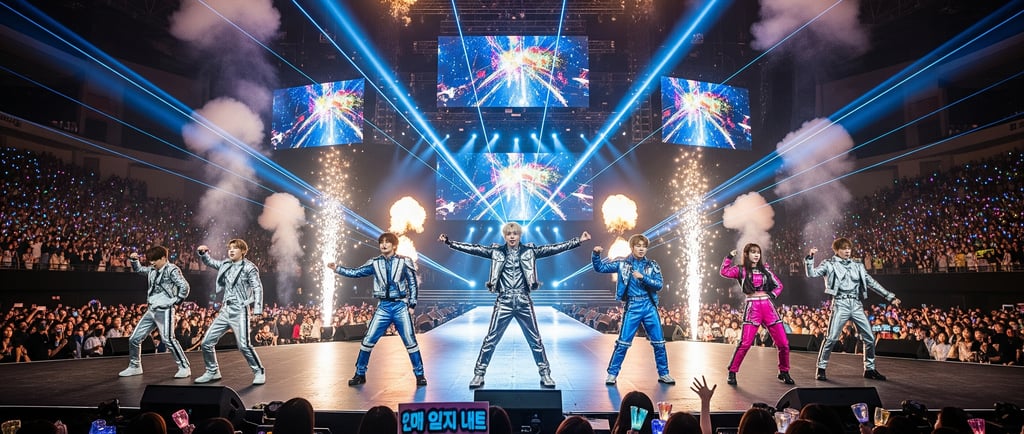K-pop: The Global Demand for Quality Translation
Discover how quality translation bridges language barriers, bringing K-pop's global fanbase closer to their idols and the rich, cultural world of Korean music.
CULTUREASIAMARKETINGSUCCESSBILINGUALGLOBALCULTUREKOREANINTERPRETATIONLINGUISTICLANGUAGESMULTILINGUALTRANSLATIONASIAN LANGUAGESTRANSLATOR
8/29/20253 min read


In today's globalized world, K-pop has transcended language barriers to become a worldwide phenomenon. However, its immense success isn't just due to catchy tunes and slick choreography. A crucial, yet often overlooked, element is the role of high-quality translation. For international fans, translation is the bridge that connects them to their idols, their music, and the entire K-pop culture. It's a field with unique challenges and demands, where a mistranslation can cause a minor misunderstanding or a major controversy.
More Than Just Words: The Nuances of Korean-to-English Translation
Translating Korean content for K-pop fans is a complex process that goes far beyond a simple word-for-word conversion. It requires a deep understanding of not only the language but also the cultural context. Korean is a high-context language, where much of the meaning is derived from the situation, the relationship between speakers, and unspoken social cues. English, in contrast, is a low-context language, relying more on explicit communication. This fundamental difference creates numerous translation challenges.
One of the most significant challenges is the use of honorifics and politeness levels. Korean has a complex system of speech levels that indicate respect, formality, and social hierarchy. Translating these nuances into English, which lacks a similar system, is difficult. A translator must decide whether to convey the tone through word choice, sentence structure, or by adding a note for the reader.
Another hurdle is the prevalence of cultural idioms and references. K-pop songs and variety shows are filled with slang, pop culture references, and inside jokes that are native to Korea. A literal translation would leave international fans completely lost. For example, the term 'daebak' can mean 'awesome,' 'great,' or 'unbelievable,' depending on the context. A skilled translator must provide a localized, equivalent meaning that resonates with a Western audience without losing the original intent. This is where translation becomes an act of transcreation, a term that combines translation and creation, ensuring the message and feeling are preserved.
The Power of the Fandom: Fan vs. Official Translations
The K-pop translation landscape is dominated by two key players: official translations provided by entertainment companies and fan translations created by bilingual fans.
Official translations, typically found in official music video subtitles or content released by the artists' labels, are generally professional and accurate. They adhere to industry standards and are part of a company's strategic effort to reach a wider audience. However, they can sometimes be slow to arrive, especially for live content like V LIVE broadcasts or impromptu social media posts. They also may err on the side of caution, sometimes losing the casual, intimate tone that makes K-pop content so engaging.
This is where fan translators come in. These dedicated individuals and teams work tirelessly, often for free, to provide real-time translations of everything from song lyrics and interviews to live streams and social media updates. Their contributions are invaluable to the international K-pop community. Fan translations often include "translator's notes" (T/Ns) that provide extra context, explain cultural references, or clarify a pun. This personalized, communal approach builds a sense of intimacy and shared understanding within the fandom.
However, fan translations are not without their risks. Because they are unregulated and often done quickly, they can be prone to errors or misinterpretations. An inaccurate translation, particularly for a sensitive topic, can spread like wildfire and lead to widespread misunderstandings or fan wars. Despite these risks, the demand for timely, comprehensive, and contextually rich translations from the fandom remains high.
Why Quality Translation Matters
The demand for quality translation in K-pop is a testament to the powerful connection between artists and their fans. It's about more than just understanding the words; it's about feeling the emotion behind a song, appreciating the wit of a joke, and connecting with the person, not just the persona.
Quality translation is a key driver of K-pop's global expansion. It democratizes access to content, allowing fans in diverse linguistic backgrounds to fully participate in the fandom. It fosters a sense of community, as fans can discuss and share content, strengthening their bond with both the artists and each other. Ultimately, in a world where pop culture is a powerful tool for cultural exchange, quality translation isn't just a service—it's a necessity that helps bridge divides and build a global family of fans.
Translations
Expert translations for businesses and individuals worldwide.
© 2024. All rights reserved.
